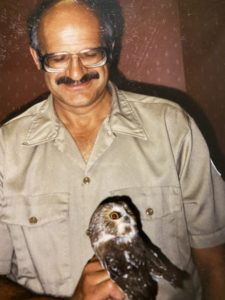Owls have always fascinated people. Native people sometimes feared them and told scary stories about them to their children. After all, they are mysterious, wide-eyed, and have a curious, all-knowing expression. I think their incorporation to the world of Harry Potter increased the public’s interest in owls, and that interest has certainly engaged the public.
The very first activity at Woodland Dunes, before the organization officially existed, was bird banding- dating back to the mid-1960’s. Tens of thousands of songbirds were caught and banded by founder Bernie Brouchoud, assisted by naturalists Jim Steffen, John Woodcock, and others. Most birds were songbirds. But one evening while Bernie was trying to catch woodcock during fall migration, he caught a northern saw-whet owl.
At that time, saw-whets were considered rare- encountered by people only a few times a year in Wisconsin. Bernie decided to open his nets other nights. Sure enough, he caught more owls. Then, he learned that the owls can be attracted to playing a recording of their song, and when he started doing that, he caught dozens of owls on some nights, hundreds over the course of the fall!
The State bird checklist was changed to reflect the fact that the owls were not rare, just very secretive. Bernie became better and better at finding and banding them and tracking their movements after release as other banding stations were established.
Our banded owls were re-caught by other banders in a number of locations- in fall at Cedar Grove Ornithological Station south of Sheboygan, southern Wisconsin, Illinois, Indiana- even as far away as North Carolina. In spring he found they traveled north to Duluth, Whitefish Point in the UP, Thunder Bay, and other locations. Like other birds, they travel along the shorelines of the Great Lakes, making Woodland Dunes a good place to encounter them.
Bernie continued for the next forty years each October and recruited a number of volunteers to help. Only licensed banders can actually do the banding, but volunteers could help check nets and remove birds that were caught. During that time, Bernie started an event called Owlfest, to mark the time each fall when the little owls migrate. People were able to see the owls up close and learn about them and watch their release. It was a very popular event, but we realized there were also some problems. The birds are nocturnal, and holding them for a daytime event and exposing them to large numbers of people was stressful for them. Our primary interest is the welfare of the birds, and we realized that things needed to change. Owlfest then became a nighttime event, but the migration varies from night to night, and it was difficult to predict on which nights we would catch owls. During one, we waited for hours, and finally dismissed our visitors without catching an owl, very disappointing. After they left, a few minutes later we caught one and banded it. We still certainly educated people about owls, but it was still a frustrating experience.
Then we teamed up with another organization, Wildlife of Wisconsin (W.O.W.), who help injured wild animals. They have several owls and other birds that have been injured and wouldn’t survive in the wild. They keep those birds for education purposes, and the birds are well cared for. Instead of catching owls ourselves for the event, we partnered with WOW, who brought their birds to show and educate the public. The event could again be done during the day or evening, and people could see the birds up close without harming them in the process.
Recently, Owlfest was changed to Owl Week, this spreads the Owlfest activities over several days. Owl week this year is next week, starting on Monday the 25th. There will be owl-related activity kits for people to pick up and do as a family, Nature-time Tuesday with more owl activities for children, a program by Wildlife of Wisconsin, a talk about the history of owl banding at Woodland Dunes, and more. The schedule is here: https://www.woodlanddunes.org/owl-fest/
Over 5,000 owls have been caught and banded at Woodland Dunes: saw-whets, screech owls, and long-eared owls. Saw-whets are especially interesting, the smallest owls in Wisconsin. They are spirits of the wilderness- always present by being invisible. Their seasonal movements are still not completely understood, and the information we gather is shared through the USGS Bird Banding Laboratory with researchers studying the birds. Owl week is our annual opportunity to tell their story at Woodland Dunes, in hopes that people will become interested in and care about them, and all of the natural world.
photo- Bernie Brouchoud with a saw-whet owl he banded

